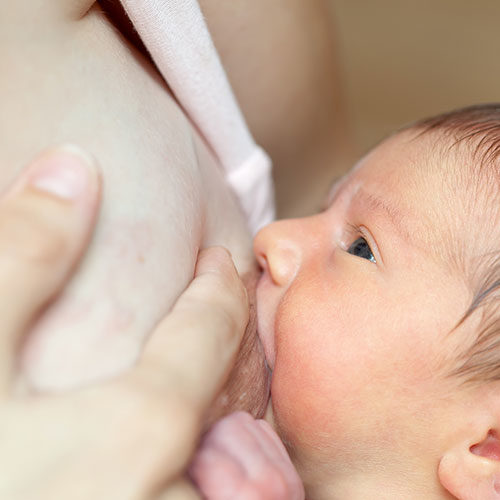What is Gut Microbiome?
Human bodies harbour a vast array of tiny organisms. These microorganisms include bacteria, viruses, fungi and other microbes. All of these together make the human microbiota.

How is the gut microbiome acquired?
We acquire a lot of microbes from our surroundings. However, the gut microbiome is acquired through surroundings only partly. A theory suggests that the environment inside the mother’s womb is sterile. The first exposure to the microbes takes place at the time of birth. The mother’s microbiome has reached an optimal mix during pregnancy for the baby. During vaginal birth, the baby comes in touch with the mother’s microbiome in the birth canal. It is like a gulp at birth and is very important in starting the whole process of microbe hand-over. However, in c-section births, this doesn’t happen. After the birth, the maternal microbe transfer continues as there is skin-to-skin contact between the baby and the mother. Breastfeeding enhances this process significantly and delivers microbes to the baby from the areola as well as through the breast milk. All of this contributes to a great extent in forming the baby’s gut microbiome.
Why is the gut microbiome important?
The millions of microbes living inside and on our bodies play a very important role in keeping us healthy. In recent studies, scientists have found that bacteria commonly found on the skin might help protect us against skin cancer. The microbiome is instrumental in programming our immune system, reducing risks of allergy, providing nutrients for our cells and preventing colonization of harmful bacteria and viruses.
Similarly, the gut microbiome plays a major role in digestion and contributes to our immunity. Over recent years, the gut microbiome in particular has been linked to a plethora of diseases and conditions, from diabetes to autism and anxiety to obesity.
Breastfeeding and the gut microbiome:
As mentioned earlier, breastfeeding can shape the human gut microbiome. Breast milk helps in many different ways in forming, maintaining, adapting and strengthening our gut microbiome.
- Breast milk provides maternal microbes to the baby’s gut.
- About 30% of beneficial bacteria in the baby’s gut comes directly from breast milk.
- Approximately 10% of good microbes are transferred to the baby from the areola and breasts of the mother.
- In addition to the microbes which are essential for the infant’s health, breast milk also contains indigestible complex chains of sugars called oligosaccharides. These sugars are food for the gut bacteria, thus, helping them proliferate and thrive.
- Some microbes found in the infant gut help to break down the array of sugars found in human breast milk. This, in a way, establishes an interdependent relationship between breast milk and the gut microbiome.
Human gut microbiome changes rapidly over the first two years of life, shaped by breast milk to a great extent. This is why breastfeeding is extremely important during this stage. The longer the breastfeeding continues, the more the benefits to the baby’s gut microbiome; leading to good health.
Can a breastfeeding mother influence her baby’s gut microbiome?
A breastfeeding mother can influence her baby’s gut by healing her own gut. This requires consuming a balanced diet. Eliminating processed foods, including prebiotics and probiotics in her own diet, can help a lot. Once the mother’s good microbes are multiplied, it then influences the baby’s gut microbiome through her breast milk.
Examples of some probiotics:
- Home-made pickles.
- Home-made Dahi/ curd from dairy.
- Overnight fermented rice with water.
- Kanji.
- Diluted unpasteurized coconut vinegar/ apple cider vinegar.
Examples of some commonly found prebiotics:
- Garlic
- Onions
- Bananas
Factors other than breastfeeding that can affect the microbiome:
- Mother’s gut health before and during pregnancy.
- Mother’s consumption of medicines during pregnancy (especially antibiotics). It can lead to a higher percentage of antibiotic resistance bacteria in the baby’s gut.
- Antibiotics prescribed to the baby.
- Formula feeding can inhibit the growth and colonisation of microbes in the baby’s gut.
References :
https://www.theguardian.com/news/2018/mar/26/the-human-microbiome-why-our-microbes-could-be-key-to-our-health
https://www.unicef.org.uk/babyfriendly/news-and-research/baby-friendly-research/infant-health-research/epigenetics-microbiome-research/
https://www.ncbi.nlm.nih.gov/pmc/articles/PMC6400986/
https://www.sciencedaily.com/releases/2017/05/170508112411.htm?fbclid=IwAR1WIAV-uVWIX-gkBztpPqUjvUvv7saWhdyjw2dLgYwpvSe2KbH197HyA0o
https://www.ncbi.nlm.nih.gov/pmc/articles/PMC4686345/?fbclid=IwAR3eBvQuxxBNIeQlQkvnUaRaSwy9ZSUErA2mr_6XWfQgoaGXqhA2FUONn3Q
Wish to speak with a member of our team who is a certified lactation professional and also an experienced breastfeeding mother, click on this link.
Medical Advice Disclaimer
THIS WEBSITE DOES NOT PROVIDE MEDICAL ADVICE.
The information, including but not limited to, text, graphics, images and other material contained on this website are for informational purposes only. No material on this site is intended to be a substitute for professional medical advice, diagnosis or treatment. Always seek the advice of your physician or other qualified health care provider with any questions you may have regarding a medical condition or treatment before undertaking a new health care regimen, and never disregard professional medical advice or delay in seeking it because of something you have read on this website.
Disclaimer
We understand and acknowledge that parents and babies can be of various genders on a spectrum of LGBTQI+. Families come in diverse flavours. However, in our articles, for the sake of simplicity and convenience, we will be referring to the breastfeeding parent as the mother and using the female pronouns- ‘she’ and ‘her’ for babies. Babies can be nourished and nurtured in different ways and while we have used the terms breastfeeding and nursing, we recognize that parents can opt to chest feed or finger feed.
We don’t have conflicts of interest and declare, and we are compliant with the WHO code of marketing of breastmilk substitutes and the IMS act.
In case you find any information on this website that needs to be updated, please write to us at info@bsim.org.in






